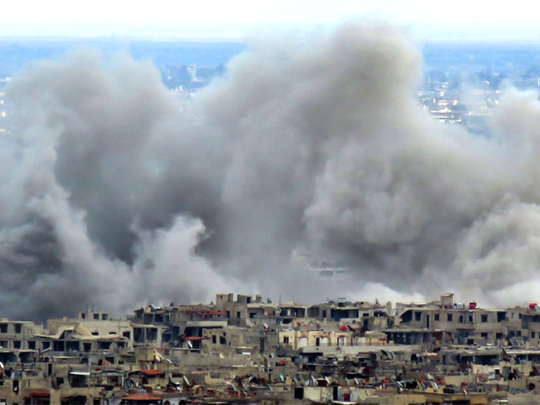
Military escalation between Israel and Iran-backed Syria in February stopped just short of all-out war between Israel and Iran, along with its proxies such as Lebanon’s Hezbollah. Many interpretations for the escalation are coming forth. Several commentators have noted that the scenario was more akin to clashes rather than war, even if it has the likelihood of becoming the ‘Mother of all Clashes’, as some observers feel.
Encouraged by Russian intervention to calm the Israelis down, there is speculation of possible Russian-American friction in Syria. All that might have been there (and these facts need mentioning) but the main reason the escalation subsided quickly is that no party is willing to get itself embroiled in a prolonged war now — be it Israel, Iran, the US, Turkey, or Russia.
People were anxious because they have been hearing analysts saying, for some time now, that a ‘big war’ between Israel and Hezbollah is imminent, and many thought that the last escalation in Syria would be the spark that would ignite it.
In fact, it was more than a clash and less of a war as it involved the downing of two aircraft: an Iranian-made Syrian drone and American-made Israeli F-16 fighter jet. Multiple rounds of Israeli air strikes on targets in Syria are not unprecedented, but before they used to happen without any Israeli losses. Also, Israeli air raids on Syria mostly targeted Iranian military hardware being smuggled to Hezbollah in Lebanon.
Iranian factor
What might be common between this attack and the previous Israeli air strikes on Syria is the Iranian factor. Israel might have no major issues with Russia’s presence in Syria and even a Turkish one might not be as problematic to the Israelis. However, an Iranian presence in Syria will not be tolerated by Tel Aviv.
Indeed, the time of all those parties’ involvement in Syria — fighting Daesh (the self-proclaimed Islamic State of Iraq and the Levant) and other groups — gave Israel a space of relief as it was focused on tackling fighting near its borders. But as Daesh’s ranks dwindle, and northern Syria is now a matter of debate — even if it’s militarised in some spots, between the Americans, the Russians, and the Turks — the Syrian regime might turn south and south-west, coming close to Israeli border buffer areas.
Also, when Hezbollah was too heavily involved in the Syrian internal fight, the Israelis were content that the Iranian proxy would not be willing to go to war on another front. Now, almost all pretexts of a ‘Big War’ are there except for the resolve to fire the first bullet in the anticipated, nihilistic military struggle.
Starting with the two concerned powers militarily active in Syria, the US and Russia, both are not keen on returning to Cold War era of war-by-proxy — at least for now. Then there are two regional powers, again militarily active in Syria, that’s Turkey and Iran, who probably agree by necessity rather than enthusiasm that Israeli involvement might hinder their respective strategies in the region.
Yet, that doesn’t mean that the two main antagonistic parties are not preparing for the moment when they might get into a fight, indirectly and directly if needed. There is also concern coming from other regional players who want to curb Iran’s influence in the region.
Tricky situation
It’s a tricky situation, with poor calculation of the risks and the long-term consequences. An all-out war might break out between Israel and Hezbollah, but it most likely will drag Syria, and probably Iraq — where Iranian forces and proxies are spread, into a protracted conflict.
The spilling of fire from the whole of the Levant would probably be an inevitable by-product that can’t be excluded. Unfortunately, such a bloody scenario might provide the best habitat for nurturing a form of terrorism more brutal than both Al Qaida and Daesh. Thus, all the efforts of the anti-terrorism alliance over the last few years will have gone in vain. No one needs this, even those suffering Iran’s aggressive policies through its proxies.
The best approach actually to what’s going on now is a bit far from the region, as the Americans continue to persuade the Europeans to rewrite the Iranian nuclear agreement, extending it to include a commitment from Tehran to stop its ballistic missile proliferation and its meddling in its neighbours’ internal affairs.
Here, Israel’s rhetorical pressure would help the Americans in their dialogue with Europe. Russia and Turkey might be coordinating with Iran on Syria, but are not necessarily opposed to the idea of ‘containing’ Iran, much in the same way as the Americans and the Israelis.
Helping in this regard is the mobilisation of international pressure on Iran to stop arming Al Houthis in Yemen. In addition to destabilising Gulf neighbouring countries, the Al Houthi Iranian proxy is fomenting terrorism in a relatively stable region aspiring for peaceful development.
Dr Ahmad Mustafa is an Abu Dhabi-based journalist.










